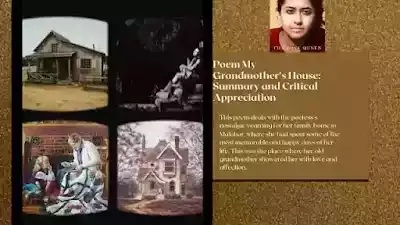 |
| Poem My Grandmother's House: Summary and Critical Appreciation |
Summary of the Poem:
The poetess remembers passionately her family home in Malabar where she spent some years of her early life under the great affection of her grandmother. The poetess's grandmother was great fond of her. She liked the company of her grandmother. She spent some of the happiest year in her grandmother's company. The poetess had gone to live in a different city which was quite far from grandmother's home. The poetess recalls her grandmother and the day she died. She (the poetess) was very young at that time and did not know how to read the books which lay in the house. The death of her grandmother had robbed the little girl of her capacity to feel. She was greatly shocked by the death of her grandmother.
Critical Appreciation:
Introduction:
The poem entitled My Grandmother's House, has been taken from the first collection of Kamala Das' poems Summer in Calcutta published in 1965. This poem deals with the poetess's nostalgic yearning for her family home in Malabar, where she had spent some of the most memorable and happy days of her life. This was the place where her old grandmother showered her with love and affection. In the poem she remembers both of them together, the old woman-her grandmother and the house in which she once lived. Even though the poetess lives in another city, far from her grand- mother's house, the memories of childhood, when she lived in the house are still alive. Her emotions overwhelm her. She indicates her agony by the use of ellipses. She portrays a very emotional picture in the expression "the house withdrew" as if the house were alive and could not bear to stay there anymore, as the one if loved had gone forever.
Thought-Content:
The poetess remembers her family home in Malabar where she spent some years of her early life in the affectionate and sheltering care of her grand- mother. She loved the poetess most. Now the poetess had gone to live in a different city, quite far from grandmother's home. But she wistfully remembers the family home where she lived as a girl, and her grandmother who showered love and affection on her. The poetess was very young at that time. There were a large number of books in the house, which seemed to be repulsive and horrible like snakes. The grandmother's death shocked her. She became cold and pale like the Moon. The poetess passionately yearns to go to the great house and to look once again through its windows which are blind. The house is now entirely deserted and no one can look through the windows. The poetess longs to sit there by herself and to listen to the dreary music of blowing cold winter winds, which would revive memories of her grandmother. At the end of her visit to the old family home she would like to return to her new home in a distant, far off place, but the painful memories of the bygone days would accompany her. She got love from her grandmother in her girlhood. Now she pines for love and begs it even from strangers.
The Theme of Unfulfilled Love:
In this poem she speaks of her misfortune in not having received true love or affection from any man:
The 'window' image in this poem is very remarkable and suggestive. It suggests a link between the past and the present. It also underlies the languishing desire of the poetess for a sentiment peep into her past and resurrection of her dreams and desires. The Grandmother's House is a symbolic retreat for the poetess to a world of innocence, purity. love and simplicity from a world of corruption, sterility exploitation and cunningness. It is a sanctuary of love which is conspicuous by its absence in the harsh world of reality.
The Poetess’ Arousing Deep Sympathy:
The poetess's life seems to be meaningless because she has always been deprived from true love. The sense of futility of life has most effectively been conveyed to us by this poem. There are some key phrases in the poem which convey us a sense of despair and the feeling of futility The house withdrew into silence, Just listen to the frozen air, And beg now at strangers' door.
Style and Language:
A powerful emotional effect has been achieved by the author by a use of minimum possible number, of words. The poetess has shown a remarkable capacity to avoid garrulity and copiousness. The poem is compact and well-knit so far as its structure is concerned. The style of writing here is terse. 'Cold like the Moon' is quite an appropriate Simile. 'An armful of darkness' is quite a satisfactory metaphor. 'Like a brooding dog' is a clumsy simile. The phrase 'in small change' is a metaphorical way of saying 'in a small quantity'.






